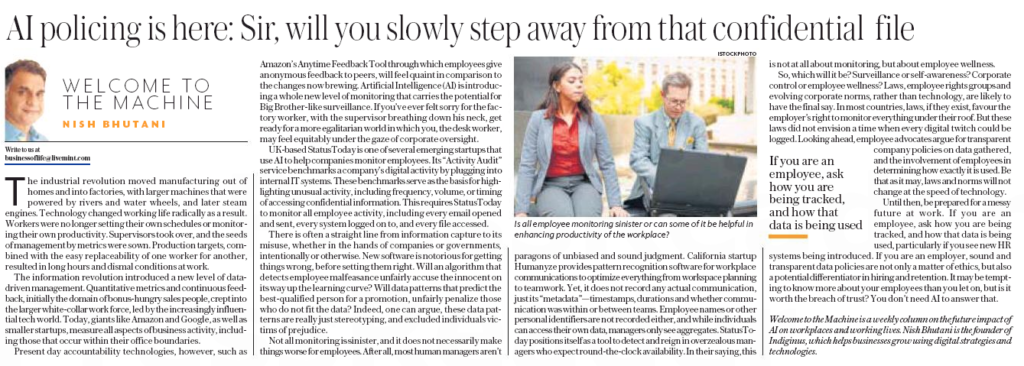Picture Credit: httpss://www.livemint.com/
If you are an employee, ask how you are being tracked, and how that data is being used
By Nish Bhutani, Founder & CEO – Indiginus
As published in the Mint on October 23, 2018

The industrial revolution moved manufacturing out of homes and into factories, with larger machines that were powered by rivers and water wheels, and later steam engines. Technology changed working life radically as a result. Workers were no longer setting their own schedules or monitoring their own productivity. Supervisors took over, and the seeds of management by metrics were sown. Production targets, combined with the easy replaceability of one worker for another, resulted in long hours and dismal conditions at work.
The information revolution introduced a new level of data-driven management. Quantitative metrics and continuous feedback, initially the domain of bonus-hungry sales people, crept into the larger white-collar work force, led by the increasingly influential tech world. Today, giants like Amazon and Google, as well as smaller startups, measure all aspects of business activity, including those that occur within their office boundaries.
Present day accountability technologies, however, such as Amazon’s Anytime Feedback Tool through which employees give anonymous feedback to peers, will feel quaint in comparison to the changes now brewing. Artificial Intelligence (AI) is introducing a whole new level of monitoring that carries the potential for Big Brother-like surveillance. If you’ve ever felt sorry for the factory worker, with the supervisor breathing down his neck, get ready for a more egalitarian world in which you, the desk worker, may feel equitably under the gaze of corporate oversight.
UK-based StatusToday is one of several emerging startups that use AI to help companies monitor employees. Its “Activity Audit” service benchmarks a company’s digital activity by plugging into internal IT systems. These benchmarks serve as the basis for highlighting unusual activity, including frequency, volume, or timing of accessing confidential information. This requires StatusToday to monitor all employee activity, including every email opened and sent, every system logged on to, and every file accessed.
There is often a straight line from information capture to its misuse, whether in the hands of companies or governments, intentionally or otherwise. New software is notorious for getting things wrong, before setting them right. Will an algorithm that detects employee malfeasance unfairly accuse the innocent on its way up the learning curve? Will data patterns that predict the best-qualified person for a promotion, unfairly penalize those who do not fit the data? Indeed, one can argue, these data patterns are really just stereotyping, and excluded individuals victims of prejudice.
Not all monitoring is sinister, and it does not necessarily make things worse for employees. After all, most human managers aren’t paragons of unbiased and sound judgment. California startup Humanyze provides pattern recognition software for workplace communications to optimize everything from workspace planning to teamwork. Yet, it does not record any actual communication, just its “metadata”—timestamps, durations and whether communication was within or between teams. Employee names or other personal identifiers are not recorded either, and while individuals can access their own data, managers only see aggregates. StatusToday positions itself as a tool to detect and reign in overzealous managers who expect round-the-clock availability. In their saying, this is not at all about monitoring, but about employee wellness.
So, which will it be? Surveillance or self-awareness? Corporate control or employee wellness? Laws, employee rights groups and evolving corporate norms, rather than technology, are likely to have the final say. In most countries, laws, if they exist, favour the employer’s right to monitor everything under their roof. But these laws did not envision a time when every digital twitch could be logged. Looking ahead, employee advocates argue for transparent company policies on data gathered, and the involvement of employees in determining how exactly it is used. Be that as it may, laws and norms will not change at the speed of technology.
Until then, be prepared for a messy future at work. If you are an employee, ask how you are being tracked, and how that data is being used, particularly if you see new HR systems being introduced. If you are an employer, sound and transparent data policies are not only a matter of ethics, but also a potential differentiator in hiring and retention. It may be tempting to know more about your employees than you let on, but is it worth the breach of trust? You don’t need AI to answer that.
Welcome to the Machine is a weekly column on the future impact of AI on workplaces and working lives. Nish Bhutani is the founder of Indiginus, which helps businesses grow using digital strategies and technologies.




